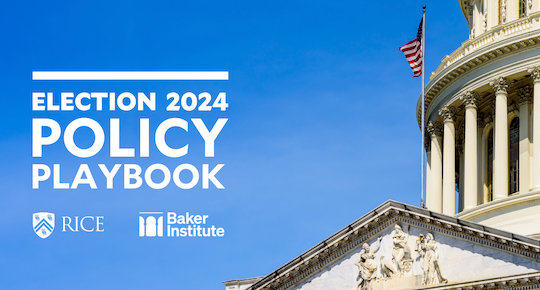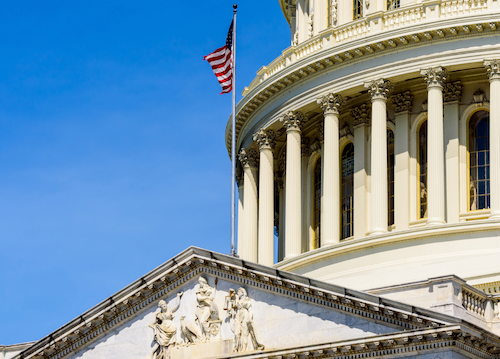Nonpartisan data and insights on the top issues of the upcoming election such as the southern border, energy sustainability and resilient communities are available in “Election 2024: Policy Playbook,” a new series of policy briefs presented jointly by Rice University and the Baker Institute for Public Policy. The series offers critical context, analysis and recommendations to equip policy leaders governing the U.S. and Texas in 2025.
The “Policy Playbook” series will continually produce briefs until the Nov. 5 election and cover topics in eight categories: economy and jobs; science, tech and innovation; energy and sustainability; strong and resilient communities; health and education; borders and immigration; security and diplomacy; and Texas, the second-largest state economy in the country and eighth-largest economy among world nations.
“(Rice’s) Baker Institute is recognized as the number one university-based think tank in the world,” said Amy Dittmar, Howard R. Hughes Provost and executive vice president for academic affairs at Rice. “As a community of scholars and students, we are moving beyond the soundbites to build a more informed and productive discourse.”
The first round of briefs, published today, explores universal free school breakfast and lunch policies; the influence of the Christian electorate; the transition to clean electricity; the upcoming review of the United States-Mexico-Canada Agreement; America’s waning leadership in science and technology; Mexico’s water debt; the role immigrants play in the U.S. labor market; and the implementation of school voucher policies in Texas.

Congress should support universal free school breakfast and lunches for all U.S. public school children, argues Rachel Kimbro, dean of Rice’s School of Social Sciences, in her brief, “Address Child Hunger Through Free School Meals for All.” Introducing universal free meals improves student performance across a range of academic and behavioral outcomes, she argues.
“No matter how hard families work to piece together formal and informal supports, food security remains an intergenerational challenge for marginalized communities,” Kimbro wrote. “This can only be remedied by concerted and decisive government action to better distribute resources in a way that does not create additional challenges for hard-working families. Stigma and fear of surveillance holds many families back from seeking food assistance, and universal provision can help to mitigate this.”
Electricity demand will be asked to supply the needs of artificial intelligence and increasingly electrified vehicles, buildings and industry – but the transition is not fast enough to meet clean electricity and climate goals, argues Daniel Cohan, professor of civil and environmental engineering at Rice, in his contribution to the university-wide project, “Prioritize Reforms to Accelerate the Shift to Clean Electricity.” He recommends that public utility commissions and regional grid managers should work to streamline the process for grid connections.
“What matters most for turning projects from proposals into reality will be streamlining the processes by which grid managers approve new projects,” Cohen wrote. “The less cumbersome process for approving projects in ERCOT than in other regions has enabled Texas to add more solar power than other states in recent years.”
With new Mexican President Claudia Scheinbaum taking office Oct. 1 and a newly elected American President taking office on Jan. 20, the United States-Mexico-Canada Agreement (USMCA) will present an opportunity to the new negotiators, argues David Gantz, the Will Clayton Fellow in Trade and International Economics at the Baker Institute. Both American presidential candidates are not necessarily fans of the agreement, Gantz argues. His article, “Ensure North American Competitiveness Through the United States-Mexico-Canada Agreement Review,” recommends that both parties should avoid a renegotiation and instead work cooperatively on semiconductor supply chains and developing North American supplies of electric vehicle batteries and materials.
“Given the high importance of dealing with climate change in North America and the world, USMCA Parties — regardless of whether they are willing to refer explicitly to climate change as Ms. Harris would prefer and Mr. Trump would oppose — should seek means of working more effectively together on addressing related issues such as regional trade in clean energy and Mexico’s electrical energy crisis,” Gantz wrote.
The “Policy Playbook's” current briefs and future briefs can be found here. Rice’s Baker Institute for Public Policy provides meaningful policy analysis on the most critical challenges facing Texas, the U.S. and the world by conducting rigorous, data-driven research on critical foreign and domestic issues. Sign up to receive a biweekly newsletter featuring the latest briefs in the series here.

